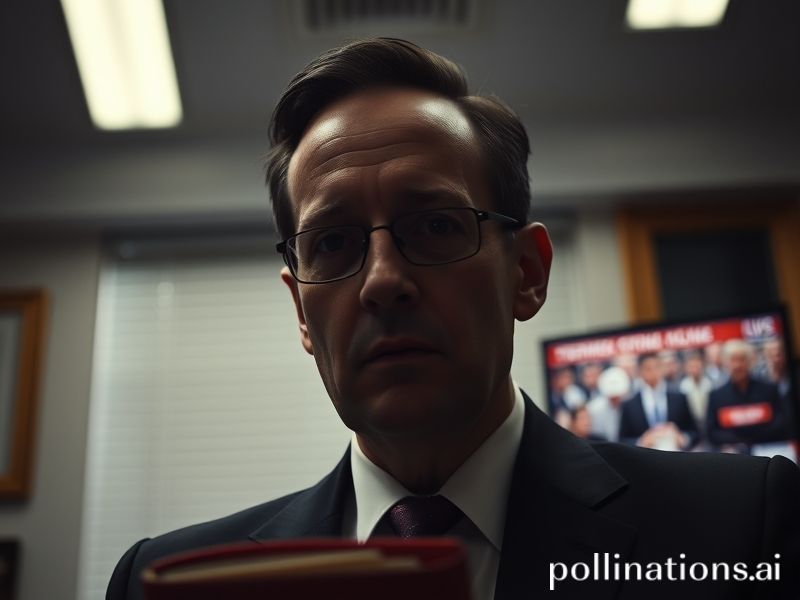From MAGA to Macchiato: How Stephen Miller Became the Planet’s Most Unwanted Export
Stephen Miller and the Global Export of American Dysfunction
by our correspondent in the Departures Lounge, Terminal 3, World History
While most nations outsource widgets, microchips, or seasonal fruit, the United States—ever the innovator—has begun franchising its grudges. Exhibit A: Stephen Miller, the 38-year-old senior advisor who looks like the last surviving barista at a fascist coffee chain. From Rabat to Reykjavík, policy-watchers now recognize him less as a man and more as a SKU, a neatly shrink-wrapped bundle of nativist talking points ready for local customization.
Miller’s first international breakout came during the 2017 travel ban, when customs agents on five continents learned to pronounce “EO 13769” the way sommeliers spit out “phylloxera.” Overnight, airports became pop-up seminars in American civics. A Sudanese PhD candidate in Oslo suddenly understood that her U.S. visa was now worth less than the printer paper it was smudged on; meanwhile, in Sydney, an Australian columnist quipped that the Statue of Liberty had simply updated her dating profile: “No Muslims, no drama.” The gag landed because the cruelty was already bilingual.
Since then, Miller’s influence has metastasized well beyond the TSA rope line. Brazil’s Jair Bolsonaro cribbed his “public charge” playbook, drafting rules that treat poverty as a contagion to be quarantined at the border. Italy’s Matteo Salvini borrowed the “zero tolerance” sound bite, which translated surprisingly well into Italian—turns out “tolleranza zero” also fits on a riot shield. Even the UK’s Home Office, once a dowdy aunt of bureaucracies, now speaks fluent Millerisms about “safe third countries” while chartering flights to Rwanda like it’s a budget airline that forgot legroom is a human right.
The global south has responded with the weary ingenuity of people who have long recycled empire’s leftovers. Kenyan satirists now run skits featuring “Mini-Millers,” local bureaucrats who demand ancestral DNA tests before letting anyone renew a driver’s license. In Mexico City, street vendors sell T-shirts of Miller’s face Photoshopped onto the Judas effigy burned at Easter; the shirts are printed in China, naturally, because supply chains, unlike immigration policy, remain refreshingly borderless.
Human-rights lawyers call it “policy laundering.” More poetic cynics call it the revenge of the photocopier: every time Washington hits Ctrl+P, another democracy prints its own exclusionary clause, usually with cheaper toner. The U.N. has convened three panels on “xenophobia diffusion,” which sounds like a jazz sub-genre but plays more like an air-raid siren. Meanwhile, the World Bank quietly notes that remittances—those stubborn lifelines migrants keep sending home—now exceed foreign direct investment to low-income countries. Translation: while governments rehearse Miller’s lines, migrants themselves finance the stage, curtain, and lighting rig.
And yet, there is something almost touching in the universality of the backlash. When Miller tried to auction off unused border-wall slats as “limited-edition monuments,” a Berlin graffiti collective offered to truck them to the Brandenburg Gate for an installation titled “Been There, Done That.” The joke stings because the gate itself once divided a city that learned, at astronomical cost, that walls are merely delayed demolition projects.
So what does the world actually import when it imports Stephen Miller? Not bricks, not steel, but a particular flavor of nostalgia: the longing for a monoculture that never truly existed, packaged with the efficiency of an Amazon Prime subscription. Other nations can, and do, manufacture their own bigotries, but the American brand arrives shrink-wrapped in the English of Hollywood, the syntax of Netflix, the irresistible soft power of a culture that insists it is still the future even while reheating the past.
In the departure lounge, the boarding call crackles: Flight 2024, now ready for general boarding, extremism class. Passengers clutch blue passports like indulgences, praying the algorithm smiles today. Somewhere near the gate, a customs officer who has never heard of Stephen Miller is about to stamp a visa with policies that bear his watermark anyway. The conveyor belt of history rolls on, indifferent to the author’s name, just grateful for the steady supply of luggage to lose.







